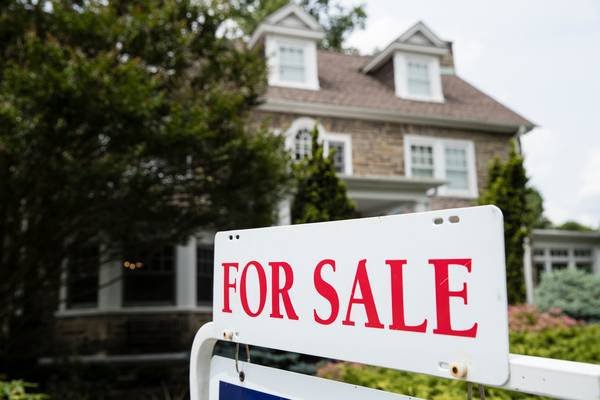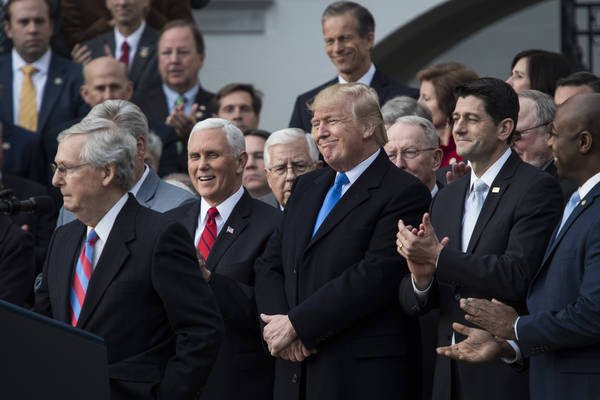
Date: 2025-04-04 Page is: DBtxt003.php txt00015644
US Economy
Inequality
Washington Post / The Finance 202: America is richer than ever but most Americans aren't. It's the GOP's economic quandary.
Burgess COMMENTARY
Peter Burgess
The Finance 202: America is richer than ever but most Americans aren't. It's the GOP's economic quandary.
The Washington Post

Cut stacks of $100 bills make their way down the line at the Bureau of Engraving and Printing Western Currency Facility in Fort Worth, Texas. (AP Photo/LM Otero)
Here’s the good news: Americans are richer than ever. The stock market closed at a record high on Thursday. Filings for unemployment benefits just fell to a 48-year low. Consumer confidence is soaring. The poverty rate is extending a three-year slide.
And yet.
The income disparity between the classes is growing, as advances by upper-income households outpace those of the middle and lower tiers. Earnings by the typical American household remain mired around where they were before the recession. Wages are inching up, despite a tight labor market, and inflation is all but wiping out those gains.
It's a tale of two economies. The strength reflected in the headline numbers remains the GOP's best defense against a midterm wipeout. But lurking just beneath them are reminders that the recovery remains patchy, and its gains have been unevenly distributed.
“The aggregates often disguise the dirt in the details,” says Diane Swonk, chief economist at accounting and consulting firm Grant Thornton LLP. “Wealth has gone up, most notably in the equity markets, but there’s a greater concentration of it in fewer households.”
Thursday offered fresh insights into how the phenomenon is playing out. A new Fed report showed combined U.S. household wealth hit a record $107 trillion in the second quarter of this year.
A rising stock market contributed $800 billion, a major chunk of the gains over the three-month period. Stocks have climbed since, with the Dow Jones industrial average on Thursday closing above a record it set back in January, as the S&P 500 also set a new high.
But as the Associated Press’s Christopher Rugaber notes, “Stock market wealth has been flowing disproportionately — and increasingly — to the most affluent households. The richest one-tenth of Americans own about 84 percent of the value of stocks.”

A for-sale sign stands in front of a house in Jenkintown, Pa. (AP Photo/Matt Rourke)
Zooming out, Moody’s Analytics chief economist Mark Zandi notes that “only half of households own any stocks, and only a quarter of households own stock of any consequence.” Stock market participation is climbing again, but Swonk notes it still has a ways to go before matching the peak it hit before the Great Recession, when 66 percent of households counted themselves investors.
It’s a similar story with home equity, the other major contributor to the growing pile of aggregate household wealth. Per Zandi, fewer than two-thirds of Americans own their homes, and fewer than a third own “significant equity.” Older homeowners have fared the best, more than recovering what they lost in the recession, Swonk says. But the overall effect has “very uneven. Foreclosures are down to almost nothing, which is great. But many people aren’t able to buy back in because of affordability: Home values have gone up much more rapidly than incomes.”
The yawning gap between the top and everybody else is evident in income disparities, too. From the AP last week: “Income growth was strongest for the richest 5 percent of households, rising 3 percent to $237,034. For the poorest one-fifth of the population, incomes rose just 0.5 percent.”
“On average, it looks great. We’re as wealthy as we’ve ever been,” Zandi says. “But that’s not representative of many, many American households. The very skewed distribution of wealth is as skewed today as it was five years ago.”
Troublingly for the Republicans, voters appear to have concluded their signature policy achievement — the tax cut package President Trump signed into law at the end of last year — only exacerbates the problem. By 61 percent to 30 percent, respondents to a private Republican National Committee poll say the measure benefits “large corporations and rich Americans” over “middle class families,” Bloomberg’s Sahil Kapur and Joshua Green write. An RNC report on the poll concludes the party has “lost the messaging battle on the issue.”

President Trump, with Senate Majority Leader Mitch McConnell of Ky., Vice President Mike Pence, House Speaker Paul Ryan of Wis., and Sen. Tim Scott (R-S.C.), speaks about the passage of the tax bill on the South Lawn at the White House last December. (Jabin Botsford/The Washington Post)
The tax cut is supplying fiscal stimulus that’s adding fuel to economic growth this year. It contributed to GDP hitting 4.2 percent in the second quarter, its strongest performance in four years. But economists expect the effects of the measure — and a massive government spending package this year that has supplied extra adrenaline — to begin fading next year.
“We have an economy that’s strong, that’s well supported in terms of economic fundamentals, and that’s boosted by a fairly large fiscal stimulus package,” says Gregory Daco, head of U.S. economics at Oxford Economics. “One thing we have to note is this may be as good as it gets. Looking further out, we don’t expect as many positive tail winds as we’ve seen for the last few quarters.”
That is, if the gulf between the haves and have-lesses isn't narrowing meaningfully now, it won’t soon. Or, as Zandi puts it, “It took us two generations to get into this mess. We won’t get out of quickly.”

Stacks of 50-subject one dollar note sheets at the U.S. Bureau of Engraving and Printing in Washington on April 14, 2015. (Andrew Harrer/Bloomberg)

Cut stacks of $100 bills make their way down the line at the Bureau of Engraving and Printing Western Currency Facility in Fort Worth, Texas. (AP Photo/LM Otero)